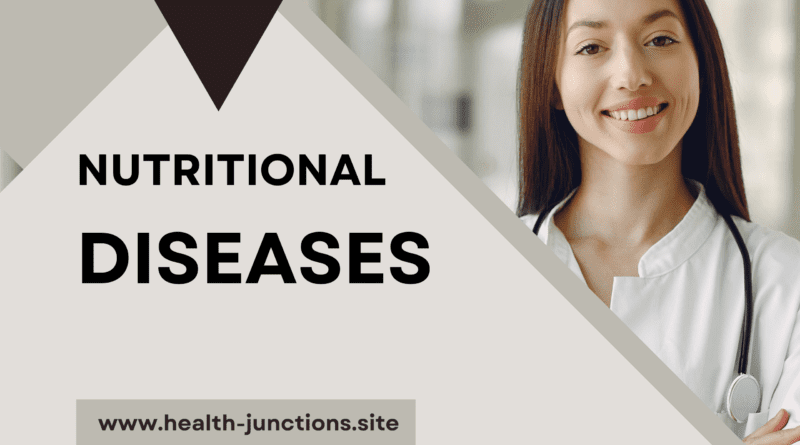What are nutritional diseases?
Introduction
In the intricate dance of maintaining our health, proper nutrition takes center stage. Nutritional diseases, also known as nutritional disorders, emerge when the body grapples with deficiencies or imbalances in crucial nutrients. This article delves into the world of nutritional diseases, exploring their types, causes, and the imperative role of balanced nutrition in preventing and managing these health conditions.
The Foundation: Proper Nutrition
Before unraveling the complexities of nutritional diseases, it’s crucial to grasp the significance of proper nutrition. The body’s optimal functioning relies on a steady supply of essential vitamins, minerals, proteins, carbohydrates, and fats. When this delicate balance is disrupted, it sets the stage for various nutritional diseases with far-reaching consequences on both physical and mental well-being.
Types of Nutritional Diseases
1. Malnutrition: A Multifaceted Challenge
Malnutrition, a pervasive nutritional disease, arises from an insufficient intake of calories, proteins, vitamins, and minerals. Its consequences are far-reaching, encompassing weight loss, stunted growth, a compromised immune system, and heightened vulnerability to infections. Unraveling the intricacies of malnutrition involves exploring its causes, symptoms, and potential mitigating strategies.

2. Iron Deficiency Anemia: A Silent Struggle
Iron deficiency anemia, characterized by low levels of red blood cells due to insufficient iron, silently affects many individuals. Fatigue, weakness, pale skin, shortness of breath, and impaired cognitive function are among its manifestations. Unpacking the causes and viable solutions to iron deficiency anemia sheds light on this often-overlooked nutritional ailment.
3. Vitamin D Deficiency: Sunlight’s Crucial Role
Vitamin D deficiency, stemming from inadequate sunlight exposure or dietary intake, poses a significant health risk. We explore the repercussions of weakened bones, muscle weakness, increased fracture susceptibility, and impaired immune function. Shedding light on the sources of vitamin D and practical ways to combat its deficiency is crucial for overall well-being.
4. Scurvy: A Historical Perspective
Scurvy, a disease associated with the past, still echoes in the present due to severe vitamin C deficiency. Fatigue, bleeding gums, joint pain, poor wound healing, and a weakened immune system characterize this ailment. Understanding the historical context of scurvy and its relevance today paints a comprehensive picture of the impact of nutritional choices on our health.
5. Rickets: Childhood Affliction
Rickets, a condition affecting children, manifests as weak and soft bones due to a deficiency of vitamin D, calcium, or phosphate. Skeletal deformities, delayed growth, muscle weakness, and an increased risk of fractures are its hallmarks. Navigating the complexities of rickets involves exploring its causes, symptoms, and avenues for prevention and treatment.

Prevention and Treatment Strategies
1. Balanced Diet: The Cornerstone of Health
A well-balanced diet forms the bedrock of preventing and managing nutritional diseases. This section delves into the components of a balanced diet, encompassing a variety of fruits, vegetables, whole grains, lean proteins, and healthy fats. Providing practical tips for incorporating these elements into daily meals empowers individuals to take charge of their nutritional well-being.
2. Nutritional Supplements: Bridging the Gap
In cases where dietary intake falls short or medical conditions hinder nutrient absorption, nutritional supplements become invaluable. This segment explores the role of supplements in fulfilling the body’s nutrient requirements, emphasizing the importance of professional guidance in their usage.

3. Fortified Foods: Nutrient Boosters
Fortified foods, such as cereals, milk, and bread, offer targeted solutions to specific nutrient deficiencies. Unveiling the benefits of these fortified options and guiding readers on incorporating them into their diets enhances their arsenal against nutritional diseases.
4. Regular Health Check-ups: Early Detection Matters
Regular health check-ups emerge as crucial tools for identifying underlying nutritional deficiencies or imbalances in their early stages. This section emphasizes the proactive role of regular check-ups in facilitating timely intervention and effective treatment.
5. Education and Awareness: Empowering Choices
Increasing awareness about proper nutrition’s pivotal role in overall health equips individuals to make informed dietary choices. This section explores the significance of education and awareness in preventing nutritional diseases, fostering a holistic approach to health and well-being.
Conclusion
Nutritional diseases are not mere abstractions; they are tangible manifestations of the intricate relationship between our bodies and the nutrients they crave. By adopting a balanced diet, considering nutritional supplements when needed, and staying informed about proper nutrition, individuals can pave the way for optimal health and well-being.
FAQs
Can nutritional diseases be completely prevented through diet alone?
While a balanced diet is crucial, individual factors play a role. Regular health check-ups and awareness contribute significantly to prevention.
Are nutritional supplements necessary for everyone?
Not necessarily. They are recommended in specific cases where dietary intake is insufficient or hindered by medical conditions.
How can I ensure my child receives enough vitamin D to prevent rickets?
Adequate sunlight exposure, a diet rich in vitamin D, and, if needed, consultation with a pediatrician can help.
Are fortified foods a reliable source of nutrients?
Yes, when chosen wisely. Fortified foods can address specific deficiencies, but a balanced diet remains essential.
Is malnutrition only a concern in developing countries?
No, malnutrition can affect individuals globally, influenced by factors like dietary choices and underlying health conditions.
READ: Secrets of Prime Minister Imran Khan’s Fitness


Pingback: How can I look prettier naturally?